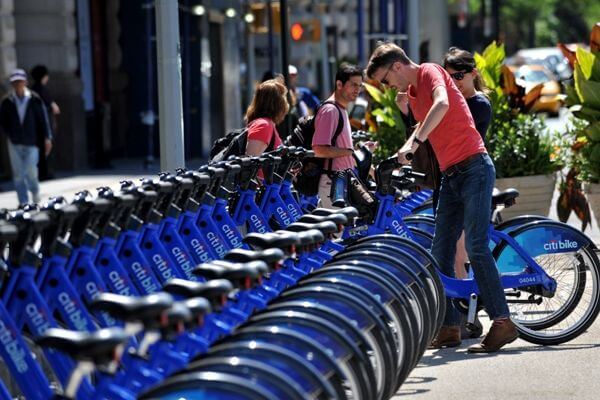Systemic Issues Threaten Citi Bike Long-Term
Here is today’s “woe is Citi Bike” update, wherein we explore why the beleaguered bike sharing program is facing financial difficulties (a.k.a. “hemorrhaging” money), even as it’s become an indispensable part of New York City’s public transportation infrastructure.
By many measures, the implementation of New York’s first bicycle-sharing program has been a success. Despite hysterical warnings that Citi Bike would bring “total carnage” to the streets of New York, the program has been remarkably safe. There has been a lot of demand and enthusiasm, too. “People want the system to succeed,” says Paul Steely White, the Executive Director of Transportation Alternatives, who were instrumental in bringing the program here in the first place.
One of the more appealing aspects of Citi Bike is its seemingly-simplistic revenue model. The idea was that corporate sponsorship would cover the program’s startup capital costs, and user fees plus ad revenue would cover the annual operating costs. This looked nice, in theory–if the program could essentially pay for itself without taxpayer contributions, what’s not to like?–but in practice the model hasn’t worked, for a number of reasons. The most obvious issues look temporary: damage to the bikes from Hurricane Sandy, a buggy credit card payment system, and a dip in ridership during this truly amazing winter.
But a closer look reveals more systemic issues that threaten the long-term viability of Citi Bike as currently constructed. Most can be traced up to Alta Bicycle Share, the Oregon-based company that oversees Citi Bike through a subsidiary. Alta has left “a lot of revenue on the table because of mismanagement,” White says. While $99 annual memberships have risen since the program was launched, daily ($9.95) and weekly ($25) passes, which are crucial to funding the operation, have tapered drastically. “They should be snaring many more daily users,” White says. “But the software is not very intuitive for people using it for the first time, and a lot of people give up.” Although a proven software alternative was offered, Alta “tried to cut corners” in developing their own, cheaper system.
Another problem White identifies is Alta’s reluctance to entertain additional investors who can give them a bigger capital base. “They’re spread very thin trying to chase other bike share contracts across the country,” he says. (Alta also operates programs in Chicago, Boston, and Washington, D.C., among seven other cities.) “They haven’t invested the time, money, and attention the New York system needs.”
The temporary hiccups and the weather have, so far, obscured deeper-rooted issues with Citi Bike. White thinks Alta may have underestimated the difficulty of implementing a system in New York. “They haven’t seemed to care, frankly,” he says. “What we’re looking for, as advocates, is that the contractor is intent to solve the issues. Some kind of systemic change is necessary, which could take many different forms. Ultimately it just means that the company managing the system is better capitalized, better managed and just cares.”
In White’s opinion, Mayor de Blasio has taken the right approach with Alta. Last week, the mayor said that the city would “collaborate with them to help them find ways to be more efficient and more effective,” but that no bailout would be forthcoming.
“If you’re a company that has had bad luck, and you’re undercapitalized, what do you do?” White says. “You get serious about finding new investment, and they haven’t done that. I don’t know if they’re just holding out for some public rescue and don’t wanna dilute their equity, but it’s the user that’s losing.”
Follow Phillip Pantuso on Twitter @phillippantuso
You might also like 




















